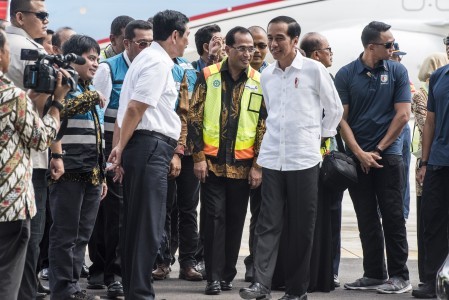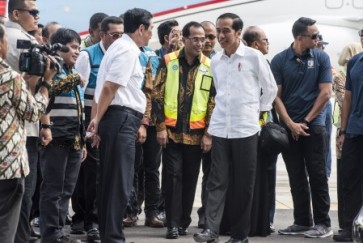Popular Reads
Top Results
Can't find what you're looking for?
View all search resultsPopular Reads
Top Results
Can't find what you're looking for?
View all search resultsA development-oriented Global Maritime Fulcrum
Change text size
Gift Premium Articles
to Anyone
P
resident Joko “Jokowi” Widodo’s Global Maritime Fulcrum (GMF) is far more than just a maritime policy: It is a grand strategy that encompasses economic, foreign policy and security statecraft. The emphasis has shifted according to reverberations between domestic and international priorities.
When the GMF was launched at the 2014 East Asian Summit in Myanmar, at its core was a narrative of development. The GMF targeted to build infrastructure and connect the country through the development of jalan tol laut (maritime highways) and 24 ports, including five deep sea ports.
Indeed, for the world’s largest archipelagic nation, Indonesia has underdeveloped maritime infrastructure. According to the World Economic Forum’s 2017 Global Competitiveness Report on port infrastructure quality, Indonesia scored 4.0, behind Malaysia at 5.4, Singapore at 6.7 and Thailand at 4.3.
The GMF also seeks to exploit untapped maritime resources. At the World Ocean Summit in 2017, Vice President Jusuf Kalla said the government targeted to more than double the contribution of the maritime sector from 11 to 25 percent of gross domestic product by 2025.
Throughout 2018, however, the narrative moved away from the developmental core toward foreign policy and strategic concerns. In particular, the emphasis shifted to the growing discourse on the loosely defined Indo-Pacific and how the GMF complemented Indonesia’s ambitions in shaping the region’s architecture.
Moreover, a lack of coordination between ministries skewed the GMF’s narrative. In response to Presidential Decree No. 16/2017 that set the GMF’s agenda, various ministries took excerpts from the decree and promoted different interpretations of it rather than pursuing a coordinated agenda.
Foreign Minister Retno LP Marsudi promised to implement the vision through enforcing sovereignty and advancing Indonesia’s Indo-Pacific concept, while the Maritime Affairs and Fisheries Ministry sought to rebrand Susi Pudjiastuti’s assertive approach to illegal fishing under the GMF. Senior officials in the Defense Ministry pushed the narrative of a global maritime “axis”, emphasizing defense and the need to develop naval capabilities.


















